Modi is tapping public anger over Opposition questioning Balakot air strike
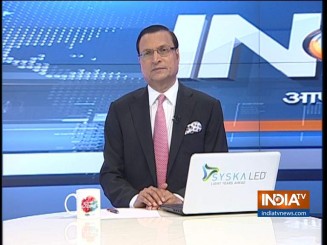 Prime Minister Narendra Modi is an astute and consummate orator-cum-politician. He has been raising the issues of national security and Kashmir in almost all his election rallies across India. Modi is questioning why the Opposition is raising doubts about the Indian Air Force air strike in Balakote (Pakistan). He is also asking why the Congress is supporting those parties which are in favour of ‘two presidents, two constitutions’ in Kashmir.
Prime Minister Narendra Modi is an astute and consummate orator-cum-politician. He has been raising the issues of national security and Kashmir in almost all his election rallies across India. Modi is questioning why the Opposition is raising doubts about the Indian Air Force air strike in Balakote (Pakistan). He is also asking why the Congress is supporting those parties which are in favour of ‘two presidents, two constitutions’ in Kashmir.
There is no doubt public anger over Congress, NCP and MNS leaders questioning the outcome of Balakot air strike. This was evident when I spoke to members of the public in Nagpur and Mumbai in our India TV show “Aap Ki Aawaaz”. People openly criticized the Opposition leaders for raising doubts about the army’s surgical strike and IAF’s Balakot air strike.
Modi has felt the pulse of the people, and he is raising this issue in almost all his public meetings. The Prime Minister is consistently alleging that the Opposition leaders have been speaking “in the language of Pakistan”.
Along with this, Modi has added the issue of Kashmir, where National Conference leader Farooq Abdullah and PDP chief Mehbooba Mufti have challenged the government to remove Article 35A and Article 370, which confer special status and legislative powers to Kashmir. These leaders have been openly advocating ‘two PMs and two constitutions”, and Modi is again tapping public anger over such statements from Kashmiri leaders. In reply, Congress and NCP leaders have been ducking these issues in their public interactions.
On Friday, nearly 150 retired officers of the Army, Navy and Air Force wrote a joint petition to the President, who is the Supreme Commander of Armed Forces, protesting against what they called ‘politicization’ of the armed forces by political leaders. Though the joint letter did not name any one leader of political party, it alleged that political leaders were trying to take credit for cross-border strikes.
The moment the joint letter appeared on media, two former chiefs Gen. S. F. Rodrigues and Air Chief Marshal N. C. Suri said their consent was not taken before including their names in the letter. Another former Army vice-chief Lt Gen M. L Naidu said he had not signed any such letter. Rahstrapati Bhavan sources said, the President is yet to receive the letter.
One of the retired officers, who drafted this letter, later said that for the first time in last 40 years, the government has given permission to the armed forces to carry out cross-border strikes. Naturally, this was a brave decision taken by a strong government, and the ruling party can take the credit and seek votes from the electorate. However, to describe the armed forces as “Modi Ki Sena” and to use images of Wing Commander Abhinandan in election posters is unacceptable.
Click Here to Watch Full Video | Get connected on Twitter, Instagram & Facebook
Modi is always best when he is aggressive
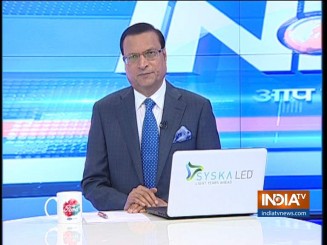 Prime Minister Narendra Modi is always at his best when he appears to be aggressive. Even as polling was going on in 91 Lok Sabha constituencies across India in the first phase, Modi, while addressing an election rally in Assam, said: “Which way the winds are blowing, can be seen from your enthusiasm. Today voting is taking place in the first phase in some parts of the country. From what we know so far, a zabardast (massive) wave for ‘phir ek baar Modi Sarkar (Modi government again)’ is visible.”
Prime Minister Narendra Modi is always at his best when he appears to be aggressive. Even as polling was going on in 91 Lok Sabha constituencies across India in the first phase, Modi, while addressing an election rally in Assam, said: “Which way the winds are blowing, can be seen from your enthusiasm. Today voting is taking place in the first phase in some parts of the country. From what we know so far, a zabardast (massive) wave for ‘phir ek baar Modi Sarkar (Modi government again)’ is visible.”
Modi indicated that his government would retain power and he clearly said that he would ensure that the Citizenship (Amendment) Bill and Triple Talaq abolition law are passed in Parliament.
Modi’s claim apart, let us see what happened on the first day of polling on Thursday. In the eight LS constituencies that went to poll in western UP, the polarization between Hindus and Muslims appeared to be complete. This can cause problems for Rashtriya Lok Dal chief Ajit Singh, who is contesting from Muzaffarnagar.
In several constituencies, diehard BSP voters were seen searching for their party’s ‘elephant’ symbol, whereas the contestant of the maha gathbandhan was from RLD, which is part of the SP-BSP alliance. Clearly, the message about maha gathbandhan has not percolated to the ground level. Moreover, BSP supremo Mayawati put Muslim voters in a fix when she openly appealed to them not to vote for Congress candidates.
There are 13 LS seats in UP out of a total of 50 LS seats in India, where Muslims dominate with more than 30 per cent votes. There are 38 LS seats having 21 pc to 30 pc Muslim voters.
The contest is tough between the BJP-Shiv Sena alliance and Congress-NCP alliance in Maharashtra. In 2014 Lok Sabha polls, the BJP-Shiv Sena alliance had won 41 out of 48 seats, but the Congress and NCP had not joined hands then. This time the Congress-NCP alliance is giving the ruling combination a tough time.
The most surprising element in the first phase of poll was in the Kashmir valley.
Nearly 35 per cent voters cast their votes in this militancy-infested volatile area close to the Line of Control. I had been saying in the past and it has now been proved right that the common man in the valley wants development and peace.
By casting their votes, the Kashmiris have rebuffed their politicians who had been demanding two PMs and two constitutions. People in the valley want better roads, electricity and the youths want education and jobs. It is time that politicians in the Valley having leanings towards separatists should understand the pulse of the people.
All in all, the jury is still out as to which party is leading in the national sweepstakes.
Click Here to Watch Full Video | Get connected on Twitter, Instagram & Facebook
Why Devendra Fadnavis said, Modi will put an end to Kashmir issue
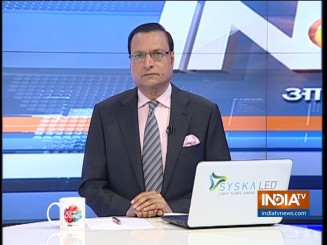 I was in Mumbai on Wednesday and Maharashtra Chief Minister Devendra Fadnavis was the guest in our show ‘Aap Ki Adalat’. Fadnavis is young and dynamic. He has definite views about current affairs and none of his replies were evasive. He clearly said that the BJP-Shiv Sena alliance will “sweep” all Lok Sabha seats from his state and will also “sweep” the assembly polls due this October.
I was in Mumbai on Wednesday and Maharashtra Chief Minister Devendra Fadnavis was the guest in our show ‘Aap Ki Adalat’. Fadnavis is young and dynamic. He has definite views about current affairs and none of his replies were evasive. He clearly said that the BJP-Shiv Sena alliance will “sweep” all Lok Sabha seats from his state and will also “sweep” the assembly polls due this October.
On J&K leader Mehbooba Mufti’s threat that if Article 35A was removed, Kashmir will sever its links with India, Fadnavis said, “we have been hearing similar threats for the last 50 years. Kashmir shall always remain part of India, and like Sardar Patel who merged 542 princely states into the Indian Union, Prime Minister Narendra Modi will definitely put an end to the Kashmir question.”
Fadnavis also spoke on saffron terror and said that “a Hindu can never become a terrorist, because the very essence of Hindutva is tolerance. Hindustan has given asylum to people of various religions who fled their countries because of persecution.”
The Maharashtra Chief Minister, who will be completing five years of rule this October, spoke extensively about his ally Shiv Sena, and made the audience guffaw when he made sarcastic remarks about NCP chief Sharad Pawar. He also spoke about MNS chief Raj Thackeray.
Fadnavis also pointed towards a new trend among younger generation hailing from traditionally political families of Congress and NCP in Maharashtra. He said, the younger generation from these political families is detaching from tradition and getting more and more attracted towards Prime Minister Narendra Modi. You can watch the Aap Ki Adalat show with Devendra Fadnavis on India TV on Saturday night at 10 pm and on Sunday at 10 am and 10 pm.
Click Here to Watch Full Video | Get connected on Twitter, Instagram & Facebook
Pakistan and US must now accept that an F-16 jet was shot down by IAF
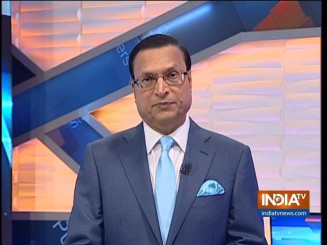 The Indian Air Force on Monday released radar images to reject Pakistan’s claim that it had not lost a F-16 fighter jet in the dogfight with IAF jets on February 27 near the Line of Control in Jammu & Kashmir.
The Indian Air Force on Monday released radar images to reject Pakistan’s claim that it had not lost a F-16 fighter jet in the dogfight with IAF jets on February 27 near the Line of Control in Jammu & Kashmir.
IAF Assistant Chief of Air Staff (Operations) Air Vice Marshal R G K Kapoor said, the Air Force had “irrefutable evidence” that an F-16 fighter jet belonging to Pakistan Air Force was shot down by MiG-21 pilot Wing Commander Abhinandan Varthaman. “The IAF has more credible information and evidence that is clearly indicative of the fact that PAF lost one F-16 aircraft. However due to security and confidentiality concerns, we are restricting the information being shared in the public domain.”
A US magazine ‘Foreign Policy’ had recently published a report attributing to two unnamed US defence officials that all the F-16 aircraft in Pakistan Air Force fleet have been accounted for, but a day later, Pentagon denied that any such inventory was audited. The IAF claim comes in the wake of these developments.
Pakistan has been caught in its web of lies and deceit. On February 27, it claimed that no F-16 aircraft was sent to the LoC. It also hid the information that one of its pilots fell to the ground in an injured condition. Nobody believed Pakistan’s claims. The next day, IAF officers displayed to the media part of an AMRAAM missile which can only be fired from an F-16 jet.
The problem with Pakistan is that it cannot admit its F-16 aircraft was shot down, because according to the terms of agreement under which the US supplied F-16 fighters, these cannot be used against India for the purpose of aggression. Pakistan Air Force, therefore, staged an elaborate cover up, but its lies have been nailed by irrefutable evidences, like radar images, electronic signatures and radio transcripts that are available with the IAF.
With the release of radar images by IAF, which is normally not done, Pakistan and the US have no other option but to accept that an F-16 fighter was indeed shot down by our pilot on February 27.
Click Here to Watch Full Video | Get connected on Twitter, Instagram & Facebook
Green Muslim League flags during Rahul road show in Kerala may spell trouble for Congress in rest of India
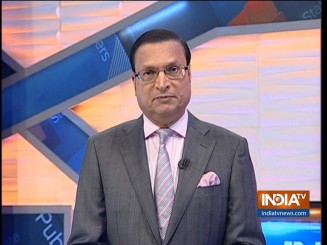 Congress president Rahul Gandhi on Thursday filed his nomination from Wayanad in Kerala. Along with his sister Priyanka and party leaders, Rahul took out a road show in which green star crescent flags of Indian Union Muslim League appeared with the tricolour Congress flags.
Congress president Rahul Gandhi on Thursday filed his nomination from Wayanad in Kerala. Along with his sister Priyanka and party leaders, Rahul took out a road show in which green star crescent flags of Indian Union Muslim League appeared with the tricolour Congress flags.
IUML is an ally of Congress in United Democratic Front in Kerala, and its flag has been the original green crescent star one. IUML has a good base in Muslim dominated pockets of Kerala, and there should be no objection to the use of the green crescent star flags.
There is no problem for Rahul as such in Wayanad because of the green flags, but when images of these green flags being displayed along with Congress flags were flashed across the nation on TV channels, it is surely going to give a wrong message to the people. The green star crescent flag happens to be Pakistan’s national flag, albeit with a white margin on the left, but the public at large in the rest of India may not take this kindly, particularly at a time when India-Pakistan tension is at its peak.
BJP leaders have already gone to town showing these pictures and videos and alleging that when Rahul Gandhi seeks Hindu votes, he puts on a ‘janeu’ and goes on temple hopping, and when he needs Muslim votes (there are roughly 29 pc Muslim voters in Wayanad), he uses green Muslim League flags.
Congress leaders will now have a tough time explaining why these green IUML flags were used in Rahul’s road show.
Click Here to Watch Full Video | Get connected on Twitter, Instagram & Facebook
Mehbooba is playing with fire by making threatening remarks on J&K’s accession
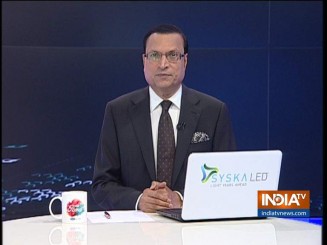 Former Jammu & Kashmir chief minister and JKPDP chief Mehboba Mufti has stoked a controversy by saying that Jammu & Kashmir’s “relations with India will end” if Articles 35A and 370 of the Constitution, which provide special status and exclusive powers to the state regarding residency, are abrogated.
Former Jammu & Kashmir chief minister and JKPDP chief Mehboba Mufti has stoked a controversy by saying that Jammu & Kashmir’s “relations with India will end” if Articles 35A and 370 of the Constitution, which provide special status and exclusive powers to the state regarding residency, are abrogated.
This comes in the wake of a remark by BJP President Amit Shah, who had said that the two articles of the Consitution “are still our issues. We need full majority in Parliament. By 2020, we will have majority (in the Rajya Sabha)”.
Reacting to Amit Shah’s remark, Mehbooba Mufti said: “If that turns out to be the case, 2020 will also be a deadline from Jammu & Kashmir to the nation. If you remove those terms and conditions on which J&K acceded to India, our relations with the country will also end.”
On Wednesday, Finance Minister Arun Jaitley described Mehbooba’s remark as ‘absurd’ and said that J&K will remain a part of India irrespective of what happens to Articles 35A and 370.
“The Instrument of Accession that Jammu & Kashmir’s Maharaja signed in 1947 was not different from the ones other princely states signed when they merged their princely states into the Indian Union. Article 370 came into being in 1950 and Article 35A was incorporated into the Constitution in 1954 and this makes it clear that these subsequent developments were not prerequisites to J&K’s accession to India.”
Jaitley said: “territorial integrity is part of the nation’s basic structure and can never be impacted by changes in the Constitution required by the country’s needs…Will India ever become part of the UK if Westminster were to revoke the Indian Independence Act?”
Political sabre rattling apart, the main issue is that of national unity and integrity. Mehbooba Mufti, Dr Farooq Abdullah and Omar Abdullah are playing with fire by making intemperate remarks. They are aware of the historical facts, but are deliberately keeping the facts away from the people of the Valley. Since it is poll fever time, such remarks are part of the usual routine, and Jaitley has done the right thing in pointing out the legal ramifications.
Click Here to Watch Full Video | Get connected on Twitter, Instagram & Facebook
Nation cannot accept any dilution of Armed Forces Special Powers Act
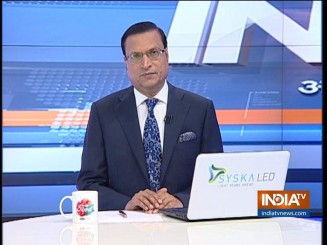 The Indian National Congress in its election manifesto released on Tuesday promised to remove the anti-sedition law (Sec 124A of IPC) and review stringent provisions of the Armed Forces Special Powers Act presently in force in Jammu and Kashmir and in several north-eastern states.
The Indian National Congress in its election manifesto released on Tuesday promised to remove the anti-sedition law (Sec 124A of IPC) and review stringent provisions of the Armed Forces Special Powers Act presently in force in Jammu and Kashmir and in several north-eastern states.
In its manifesto, the Congress has said it would “amend the AFSPA, 1958, in order to strike a balance between the powers of security forces and the human rights of citizens and to remove immunity for enforced disappearance, sexual violence and torture”.
Finance Minister Arun Jaitley immediately hit out at the Congress, describing the manifesto as “a Charter to Weaken India” and said “it appears some of the points (in the manifesto) have been drafted by Congress President’s ‘tukde-tukde’ friends, when it deals with Jammu and Kashmir and national security….Being involved in terror will no longer be a crime. The party which says this does not deserve a single vote.”
Politics apart, the prime issue is that of national security and the morale of our armed forces. We cannot put the lives and careers of our security personnel in jeopardy in the name of garnering votes. The Congress party may have promised that it would do away with stringent provisions in the AFSPA, but has Rahul Gandhi ever given a thought to what will happen to our security forces battling insurgency in Kashmir and the North-East?
Our jawans and officers risk their lives while fighting terrorists, only for the larger interest of keeping our lives safe and secure, and conversely, it is our paramount duty to ensure that the lives of our jawans and officers are kept secure and they should be spared the agony and harassment of going to law courts to defend themselves for acts that they may have committed in self-defence and in the national interest.
Once a jawan or an officer is arraigned before a law court, he loses the support of the government and his family is left to fend for itself. How can one expect a jawan or an officer to face the terrorists in the face of a law that breathes down behind its neck?
I spoke to many retired army generals who strongly denounced this provision in the Congress manifesto and have alleged that this amounts to compromising national security. Such provisions can lower the morale of our armed forces and will openly give a boost to terrorism.
The nation cannot accept such a situation in any case. We cannot have our jawans and officers fighting the terrorists with one hand tied behind their back.
Click Here to Watch Full Video | Get connected on Twitter, Instagram & Facebook
Pakistan will face another surgical strike if it carries out terrorist misadventure
 On Monday night, India TV reported on its Aaj Ki Baat show, how a large Pakistani unmanned aerial vehicle was sighted across Khemkaran sector in Punjab and Indian Air Force scrambled two Sukhoi-30MKI jet fighters to stop the intrusion. As a panic reaction, Pakistan Air Force then scrambled its F-16 fighters, but since there was no airspace violation from either side, tensions receded soon after. This incident took place on early Monday morning.
On Monday night, India TV reported on its Aaj Ki Baat show, how a large Pakistani unmanned aerial vehicle was sighted across Khemkaran sector in Punjab and Indian Air Force scrambled two Sukhoi-30MKI jet fighters to stop the intrusion. As a panic reaction, Pakistan Air Force then scrambled its F-16 fighters, but since there was no airspace violation from either side, tensions receded soon after. This incident took place on early Monday morning.
This incident clearly indicates the level of high operational readiness of both the armies which are virtually on razor’s edge along the entire border and Line of Control. Fierce shelling from both sides is continuing across the 778-kilometre long LoC in Jammu & Kashmir.
Experts say there is much uneasiness in the Pakistani establishment since the successful Balakot air strike and the shooting down of a Pakistani F-16 fighter by an Indian MiG plane flown by Wing Commander Abhinandan Varthaman. Public opinion in Pakistan is openly against its own armed forces. To counter this, the Pakistani army has resorted to churning out baseless propaganda on social media.
Amidst the chest thumping exercise by the Pakistan army, there are intelligence reports of Pakistan preparing for another terrorist misadventure inside India to shore up its falling prestige. Our army, air force and navy are on high alert and ready to foil any such misadventure.
I have information from top sources in the Indian security establishment that if Pakistan carries out another terrorist misadventure of the Pulwama kind, it may invite swift retribution from India on a scale larger than the Balakot air strike.
Already there are intelligence inputs of Pakistan army regrouping the terrorists and sending them to terror training camps that have been restarted. These terror training camps are being provided army cover, and if any misadventure occurs, the next surgical strikes will be carried out against these terror camps inside Pakistan.
Click Here to Watch Full Video | Get connected on Twitter, Instagram & Facebook
Extradition of Nirav Modi will nullify Rahul’s slogan ‘Chowkidar Chor Hai’
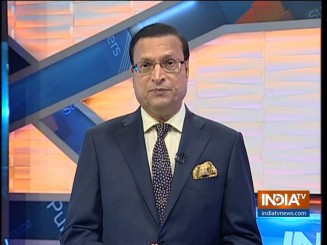 For the second time, a London court rejected fugitive diamantaire Nirva Modi’s bail petition on Friday saying that he was a flight risk and could jump bail.
For the second time, a London court rejected fugitive diamantaire Nirva Modi’s bail petition on Friday saying that he was a flight risk and could jump bail.
Chief Magistrate Emma Arbuthnot said in her order: “there are allegations of substantial fraud on the banks in India of up to US $2 billion (Rs 14,000 crore). The government of India has, very unusually for a case of fraud, alleged that interference of witnesses has taken place and that evidence has been destroyed. I am conscious of his right to bail but I find the conditions of bail do not allay my fears, so no bail.”
The Indian government’s counsel had argued that Nirav Modi had threatened to kill a witness, had destroyed evidence and even tried to buy citizenship in Vanuatu by paying $ 2 lakh. The counsel said, Nirav Modi threatened to kill a witness Ashish Lad and then offered him Rs 20 lakh to give a false statement.
Judge Emma Arbuthnot said, the bail bond offer of one million pounds was not substantial security in a case where a billion dollars is said to have been lost.
I had mentioned on the day of Nirav Modi’s arrest that he was working as an employee in a diamond jewellery company for a monthly salary of 20,000 pounds, out of which he was paying house rent of 17,000 pounds for an apartment in London. Now his job is gone, and he would not have to pay house rent since he is lodged in prison, and there are slim chances of him getting bail.
There are chances that Nirav Modi may be extradited to India soon, and if the CBI succeeds in its efforts, Rahul Gandhi’s “Chowkidar Chor Hai” slogan will stand nullified. Rahul will have to search for a new slogan to attack Prime Minister Narendra Modi.
Click Here to Watch Full Video | Get connected on Twitter, Instagram & Facebook
Why is Opposition worried over anti-satellite missile test ?
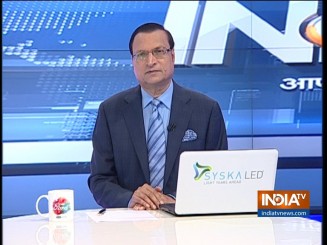 On Wednesday, India successfully tested an anti-satellite (ASAT) missile to target a live satellite on low earth orbit (300 km), thus joining the exclusive elite club of three nations, US, Russia and China, which have this capability. The three-stage interceptor missile was fired from APJ Abdul Kalam Island off Odisha coast, and soon after Prime Minister Narendra Modi, in a televised address, announced the success of ‘Mission Shakti’.
On Wednesday, India successfully tested an anti-satellite (ASAT) missile to target a live satellite on low earth orbit (300 km), thus joining the exclusive elite club of three nations, US, Russia and China, which have this capability. The three-stage interceptor missile was fired from APJ Abdul Kalam Island off Odisha coast, and soon after Prime Minister Narendra Modi, in a televised address, announced the success of ‘Mission Shakti’.
The nation salutes its scientists in DRDO (Defence Research & Development Organisation) for giving India this capability. This is surely a defining moment in our historyl. However, this test in space set off a ground war in the Indian political arena with the opposition questioning its timing.
Trinamool Congress supremo Mamata Banerjee went to the extent of complaining to the Election Commission alleging violation of Election Code of Conduct. Congress president Rahul Gandhi accused Modi of indulging in, what he called, “political theatre”.
Finance Minister Arun Jaitley promptly hit back at the Congress president making a caustic comment with the proverb “when a finger points to the moon, the idiot points to the finger”. Jaitley said the opposition was only making “clerical objections”.
Opposition leaders have praised our scientists for this achievement, but they are worried because Prime Minister Modi has changed the electoral narrative by announcing this historic anti-satellite missile test.
The most worried politician seems to be Rahul Gandhi, who had been going to town with his ambitious Rs 72,000 a year minimum income guarantee promise for the last two days. The Congress president probably thought that his NYAY (minimum income) scheme would overshadow the narrative worked out by the BJP after the IAF air strike and Kisan Samman Nidhi plan, implemented by the Modi government.
While addressing his party workers on Wednesday, Rahul Gandhi said that the Prime Minister “was looking worried” in his televised address because of the minimum guarantee scheme.
The Congress president is free to make his own assumption but the fact remains that it was Prime Minister Modi, who had the political will to approve this missile test that has made India a world space power. The lesser we politicize this issue, the better.
Click Here to Watch Full Video | Get connected on Twitter, Instagram & Facebook
Why BJP leadership decided not to field Dr M M Joshi in LS polls
 Veteran politician Dr Murli Manohar Joshi is 86 and he is part of the Marg Darshak Mandal of BJP. In the last Lok Sabha elections, Dr Joshi contested and won from Kanpur constituency. The party leadership had given him subtle hints several times in 2014 and 2019 to stay away from active politics and even offered him a Rajya Sabha seat, but the old veteran insisted that he would contest.
Veteran politician Dr Murli Manohar Joshi is 86 and he is part of the Marg Darshak Mandal of BJP. In the last Lok Sabha elections, Dr Joshi contested and won from Kanpur constituency. The party leadership had given him subtle hints several times in 2014 and 2019 to stay away from active politics and even offered him a Rajya Sabha seat, but the old veteran insisted that he would contest.
On Monday, Dr Joshi released a statement saying that the BJP organisation secretary Ram Lal has asked him “not to contest election from Kanpur or anywhere else”. The statement itself was cryptic.
In the afternoon, BJP announced that Satyadev Pachauri, a minister in UP government, will be fielded as party candidate from Kanpur. Joshi thus joins the list of party veterans L K Advani, Shanta Kumar, B C Khanduri and Bhagat Singh Koshiyari who have been denied party tickets due to old age.
It could have been better if Dr Joshi had himself offered not to contest. This could have saved embarrassment both to him and the party leadership. There is no denying the fact that Dr Joshi spent almost his entire life in building the party, he became party president, he was HRD Minister in Vajpayee’s government and he headed the party manifesto drafting committee several times. He contested and won LS seats from Allahabad, Varanasi and Kanpur.
As far as I know, neither the party had any ill feeling towards him, nor did he had any towards the party leadership. The only obstacle was his age and the party leadership has taken a correct decision in asking him to stay away from electoral contest.
The party leadership had to take into consideration the winnability issue for each and every seat in UP, because of serious challengers from the SP-BSP alliance, and the caste and community factors. The main battles of LS elections will be fought in Bihar, UP and West Bengal and the party leadership cannot afford to take risks.
Click Here to Watch Full Video | Get connected on Twitter, Instagram & Facebook
Winnability was the foremost factor in selection of BJP candidates
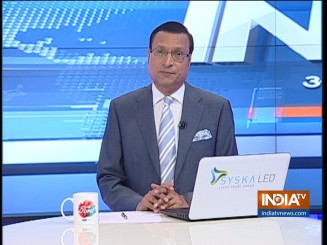 The BJP announced its first list of 184 candidates for Lok Sabha elections on Thursday and the most important announcement was: Party president Amit Shah will contest from veteran leader L K Advani’s Gandhinagar constituency in Gujarat. Amit Shah is not new to Gandhinagar because he had been looking after Advani’s election for the last many years.
The BJP announced its first list of 184 candidates for Lok Sabha elections on Thursday and the most important announcement was: Party president Amit Shah will contest from veteran leader L K Advani’s Gandhinagar constituency in Gujarat. Amit Shah is not new to Gandhinagar because he had been looking after Advani’s election for the last many years.
The suspense remains about another veteran leader Dr Murli Manohar Joshi. The candidate from Kanpur seat was not named on Thursday because there are reports that Dr Joshi wants to contest elections, and the party leadership does not want to tell ‘no’ to its veteran leader. Dr Joshi has not spoken to anybody so far, but there are indications that he may be persuaded to accept a Rajya Sabha seat, and excuse himself from the rough and tumble of Lok Sabha polls.
The list of 184 candidates clearly indicates the meticulous planning that went into deciding the names of contestants. Party chief Amit Shah obtained performance report cards for each and every MP, and this exercise was done in secrecy by professionals. These secret reports formed the basis for selection of candidates. I have seen a copy of the reports that give a clear indication of how the winnability factor of a candidate was decided.
The party leadership clearly went by the winnability factor and it cared the least about whether those who were denied tickets would become dissident or leave the party.
The second factor that worked behind preparation of the list was the clear division in the ranks of opposition. In UP, the SP-BSP alliance has kept the Congress out, in Bihar the ‘mahagathbandhan’ is still struggling to decide about the seats to be contested, in West Bengal, the Trinamool Congress has already declared its list of candidates and the Left-Congress alliance too has collapsed.
Clearly, the first round has gone to the BJP, and the Lok Sabha poll campaign may revolve only around the persona and achievements of Narendra Modi.
Click Here to Watch Full Video | Get connected on Twitter, Instagram & Facebook